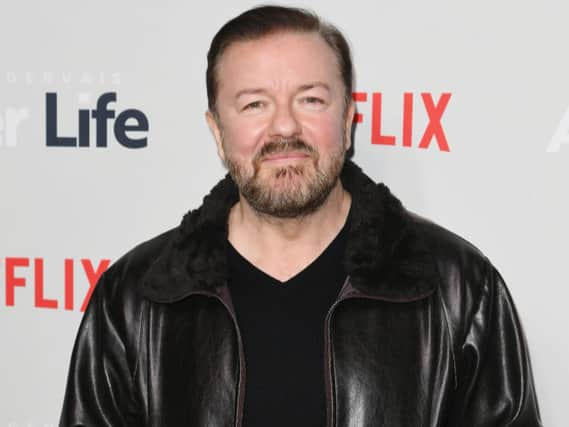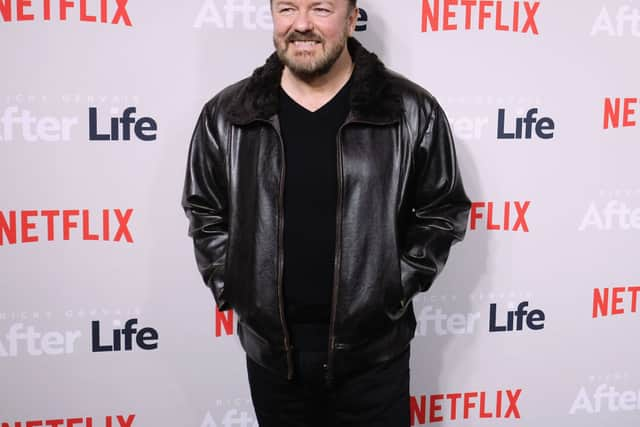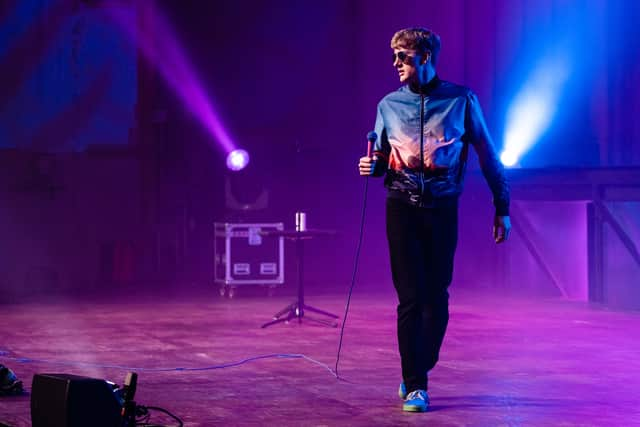Ricky Gervais SuperNature: what did stand up comedian say about trans people in Netflix comedy special?


Netflix is once again under fire for platforming “transphobic” comedians, this time with Ricky Gervais and the release of his new special, SuperNature, after staff for the streaming giant staged a walkout last year in protest of Dave Chapelle’s comedy special.
In Chappelle’s special, called The Closer, he described himself as a TERF, which stands for “trans-exclusionary radical feminist”, and refers to someone who does not believe that transgender women are women and transgender men are men.
Advertisement
Hide AdAdvertisement
Hide AdFollowing the backlash online to SuperNature, a clip from James Acasters special, titled Cold Lasagna Hate Myself 1999, has gone viral on Twitter, in which Acaster calls out “edgy comedians”.
What did Ricky Gervais say about trans people?
In his new Netflix special, SuperNature, Gervais made several jokes about trans people.
In the show, he opened by explaining that many of his jokes will be ironic, meaning: “That’s mean I say something I don’t really mean, for comic effect, and you, as an audience, you laugh at the wrong thing because you know what the right thing is.
“It’s a way of satirising attitudes.”
He then goes on to joke about “old-fashioned women. They’re the ones the wombs. Those f**king dinosaurs. I love the new women. They’re great aren’t they? The new ones we’ve been seeing lately. The ones with beards and cocks”.
Advertisement
Hide AdAdvertisement
Hide Ad

Gervais then does a bit about having a conversation with a woman who objects to sharing a bathroom with a trans woman, saying: “They are ladies, look at their pronouns. What about this person isn’t a lady?”
Gervais then responds: “Well, his penis.”
While Gervais goes on to say that “in real life, of course, I support trans rights”, he says: “Be the gender that you feel that you are. But meet me halfway, ladies: lose the cock. That’s all I’m saying.”
Gervais also dedicates a lengthy portion of SuperNature to the origins of HIV and, at one point, says: “That’s not as good at it was, Aids… in its heyday, it was f**king amazing, wasn’t it, Aids?”
He then pretends to be a gay man who, concerned about the risk posed by HIV, refuses to have sex in the 80s, now says: “Now it’s, “Give it here. I’ll take pills for the rest of my life”.”
Advertisement
Hide AdAdvertisement
Hide AdWhat has the response been like?
Reaction to SuperNature has quickly seen Gervais be called out for his intentionally harmful and transphobic jokes.
The Gay & Lesbian Alliance Against Defamation (GLAAD) issued a statement on Twitter in response to Gervais following the release of his Netflix special.
The organisation wrote: “We watched the Ricky Gervais “comedy” special on Netflix so you don’t have to. It’s full of graphic, dangerous, anti-trans rants masquerading as jokes. He also spout anti-gay rhetoric & spreads inaccurate information about HIV.
“Attention Ricky and Netflix: people living with HIV today, when on effective treatment, lead long and healthy lives and cannot transmit HIV to others. U=U.
Advertisement
Hide AdAdvertisement
Hide Ad“Netflix has a policy that content “designed to incite hate or violence” is not allowed on their platform, but we all know anti-LGBTQ content does exactly that. While Netflix is home to some groundbreaking LGBTQ shows, it refuses to enforce its own policy in comedy.
“The LGBTQ community and our allies have made it very clear that so-called comedians who spew hate in place of humour, and the media companies who give them a platform, will be held accountable. Meanwhile, there are PLENTY of funny LGBTQ comedians to support.”
In a piece for the Independent, Ryan Coogan described Gervais’ show as “just a series of trendy anti-woke statements followed by 15 seconds of Gervais laughing like he’s sat in the audience of a better comedian’s show”.
“Intentional or not, Gervais is clearly eager to be cancelled by so-called virtue-signalling, woke hypocrites,” Coogan says.
Advertisement
Hide AdAdvertisement
Hide AdJournalist and filmmaker David Farrier tweeted: “Ricky Gervais being utterly predictable and mocking transgender people in his latest special. It’s f**king insane to me how we take some of the most vulnerable, marginalised people in society… and tear them apart to hundreds of millions on Netflix like that’s okay.”
Cenk Uygur also wrote: “I know why comics like @rickygervais & Dave Chappelle love making trans jokes - it’s great publicity and trans people actually have no power. So, you can hit them over and over - and you’ll just get a new, lucrative special out of it and get right-wing love and pretend you’re brave.”
What has comedian James Acaster said?
While comic James Acaster hasn’t specifically said anything about Gervais’ new Netflix special, part of his own special, Cold Lasagna Hate Myself 1999 from 2021, has resurfaced online, in which Acaster takes aim at “edgy” comedians.
In the piece, Acaster says: “Most edgy comics look like me, race and gender wise.
Advertisement
Hide AdAdvertisement
Hide Ad“They say whatever they like, edgy comedians. Nobody tells them what they can and can’t say. They walk onstage, top of their specials sometimes, and do 10 solid minutes just slagging off transgender people.
“Straight out the gate, just making fun of transgender people. And if people on the internet get upset about it, the comedian is always like, “Bad luck! That’s my job. I’m a stand up comedian. I’m meant to challenge people. If you don’t like being challenged, don’t watch my shows. What’s the matter guys? Too challenging for you?”
“Oh yeah, cause you know who’s been long overdue a challenge? The trans community. They’ve had their guard down far too long if you ask me.
“They’ll be checking their privilege on the way home now thanks to you, you brave little cis boy!”
Advertisement
Hide AdAdvertisement
Hide AdIn the stand up special, Acaster says that he used to specifically name Gervais in that portion of the routine.
He tells the audience: “I used to name one of the comedians that was about in the routine, but it always got really awkward in the room.
“Apparently, in 2019, most people are still more than happy to laugh at transgender people - not as comfortable laughing at Ricky Gervais yet, I discovered.”


In an interview with the Metro earlier this year, Acaster explained why he felt it was an important thing to talk about in his set.
Advertisement
Hide AdAdvertisement
Hide AdHe said: “I wasn’t nervous about the reaction from people who are transphobic but I was definitely nervous about – not nervous, but I was mindful about getting it right.
“It was important to me to do it because – first of all, it started, like a lot of comedy routines do, if you see something that’s ridiculous or silly, then you want to make a joke about it and I think the attitude of comedians saying that they’re challenging people with their comedy and then punching down is just completely nonsensical because that’s not how challenging people works.
“That was the first thing that made me want to do a routine about it and then I guess I carried on doing the routine because if, in your place of work, people are behaving in a way that’s not appropriate or acceptable, or that you’re opposed to, it’s probably on you to speak out about it.”
Comment Guidelines
National World encourages reader discussion on our stories. User feedback, insights and back-and-forth exchanges add a rich layer of context to reporting. Please review our Community Guidelines before commenting.
